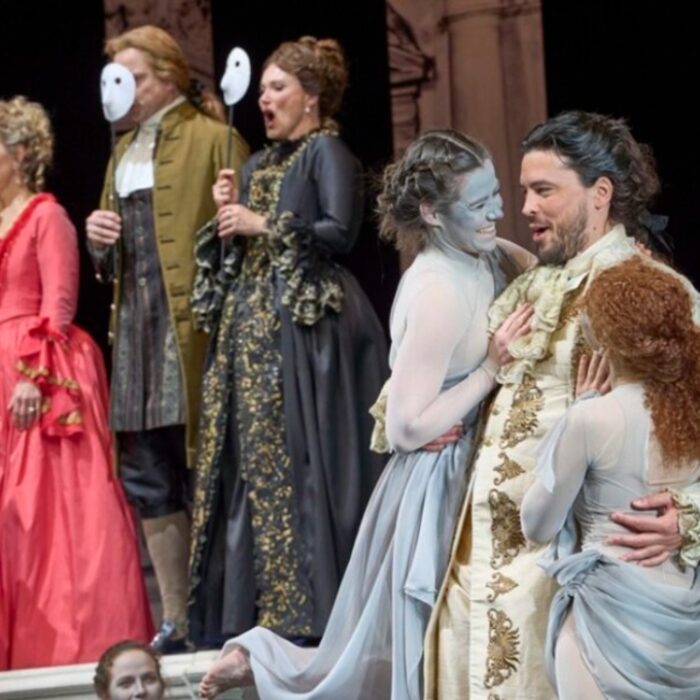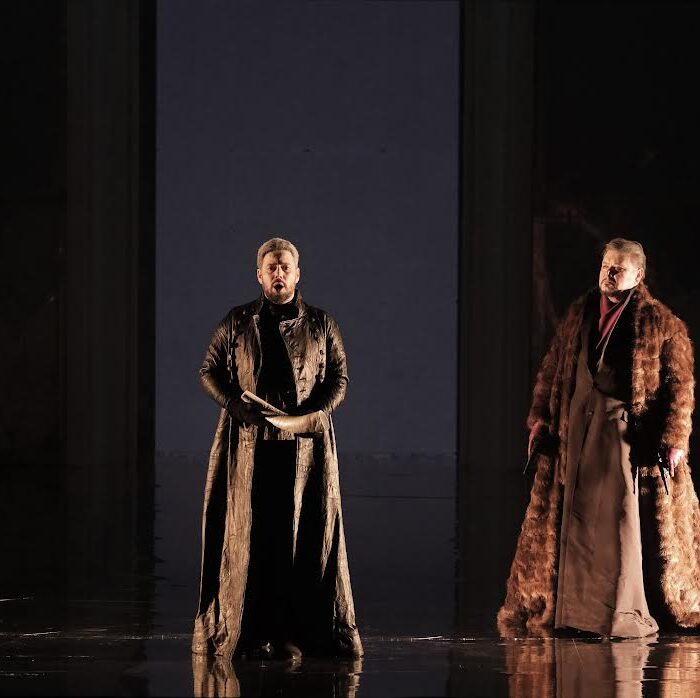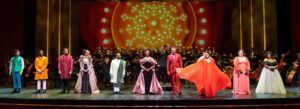
Washington National Opera 2021-22 Review: Come Home: A Celebration of Return
Washington National Opera Opens Season with Star-Studded Gala
By Francisco Salazar(Credit: Scott Suchman)
On Nov. 6, the Washington National Opera opened its 2021-22 in celebratory fashion by showcasing a gala with five international artists.
But it wasn’t just any old gala, it was particularly themed and carefully constructed. The evening was divided into three parts – the arts celebrating the return of opera and the artistic world after gloomy days of the pandemic that shuttered most theaters for 18 months; justice, which celebrated the late great Ruth Bader Ginsburg, a lover of opera and patron to the WNO; and finally liberty, which honored human nature’s ability to be free from oppression and to continue creating without restrictions as it looks toward a better and brighter future.
It was also an evening to celebrate diversity and the WNO recruited Bibhu Mohapatra to design gowns and outfits that expressed Mohapatra’s Indian roots, his American training, and his overall love of fashion.
The Artist
The evening opened with the prelude to Wagner’s “Meistersinger.” As the orchestra played, a montage of images showed the conception of the Kennedy Center and the construction of the building. It created an emotional and nostalgic moment especially since Evan Rogister’s reading of the prelude was on point with the orchestra’s sound crisp and cohesive. One could feel the ebb and flow of Wagner’s music and there was precise attention to all of the music’s layers, from lush sound of the cello’s melody to the scampering violin runs. It was a jovial opening, the right way to begin a 50th-anniversary celebration and a return to the stage.
That was followed by Elisabeth’s ʺDich, teure Halleʺ from “Tannhäuser” performed by Alexandria Shiner. The aria, which expresses Elisabeth’s joy and greeting of the great hall, was sung with tremendous charisma. Shiner possesses a rich timbre that has warmth and creamy textures that were ideal as a means of showcasing all the delight in Wagner’s piece. One was struck by the easiness in her instrument to release powerful highs and then transition into an opulent and textured middle voice.
The following piece of the evening was the Preislied from “Die Meistersinger” sung by David Butt Philip. The tenor caressed the opening Wagnerian line with a luxuriant and gleaming tone. The first two stanzas were filled with long delicate phrasing which contrasted greatly when he got to the final stanza, replete with impassioned phrasing and a quicker tempo that Rogister seamlessly managed.
For her first piece of the evening, Isabel Leonard performed Jeanine Tesori’s “The Girl in 14G” to comic effect, mixing her warm and imposing operatic voice with a musical theater sound while using a microphone. Leonard sang the musical portion with affecting diction and over-the-top facial expressions that had audience members reacting to each of her lines. Then as she mixed her operatic voice, Leonard let out high coloratura notes and even made a farcical impression of the Queen of the Night aria full of bravura.
She was followed by Carlos Simon’s “Fate Now Conquers,” a piece by the composer in residence with the WNO. The work has a Bernard Hermannesque sound that resembled the frenzied spirit of his music for “North by Northwest” or “Psycho.” Rogister conducted the piece with great emotion and with meticulous attention to the rhythm. You could hear all the details that Simon put into the piece from the violin runs to the brass’s long melodic line and the very present wind ostinatos.
Rogister then played the dooming opening chords of Antonia’s act from “Les contes d’Hoffmann” which led into the aria ʺElle a fui.” Pretty Yende walked on the stage radiating bright energy and sang the opening lines with a soft round middle voice that seems to have gotten fuller over the year. The melancholic opening phrases were delivered with a gentle and subtle emotion that were juxtaposed as she cresceondoed into the lines “Mon bienaimé, ma voix t’appelle, Oui, tout mon coeur est à toi” and sang with a fuller dynamic. However, she never allowed herself to be overtaken by the emotional phrase and Yende restrained the crescendo. On the second repeat, she once again began “Chère fleur qui viens d’éclore, Par pitié réponds moi!” with a piano sound that invoked her character’s frailty. But this time as she crescendoed into the climax, the voice took a granular sound that lost vibrancy. It worked for the character but it didn’t connect as well with her pure middle range.
The trio that followed is the moment where Antonia lets her emotions break free and she sings out with passion. That was lacking for Yende, whose voice seemed small alongside Rehanna Thelwell and Christian Van Horn. As the trio moves toward its climax, Offenbach asks the soprano to continuously rise into her higher range with increased potency. There is a sense of extremes that needs to be conveyed. However, Yende seemed to be stretching her voice to the limit to be able to give that emotional pull and unfortunately seemed strained by the time she entered the syncopated rhythms and the final C sharp. Conversely, Van Horn, who was making his first entrance of the night, entered the scene with a demonic and booming bass that chewed up the scenery. He moved about as if he was in control and at one point even started conducting the violin section. He was well accompanied by Thelwell, who possessed a chilling mezzo that resonated throughout the hall.
Lawrence Brownlee then entered for his first piece ʺL’espoir renaît dans mon âmeʺ from “Orphée et Eurydice.” Brownlee displayed polished coloratura but at times it seemed more of a virtuosic display that lacked depth. That being said both Rogister and Brownlee had smiles on their faces as they performed the work, showing that they were having the time of their lives.
Leonard’s second piece of the night was ʺSein wir wieder gutʺ from “Ariadne auf Naxos,” which she is set to debut later this season at the Metropolitan Opera. The aria is full of emotion and power but it seems a bit short out of context. However, Leonard did show off her powerful mezzo as it rang over the lush orchestra.
The first half of the evening ended with ʺVa pensiero” and “Oh, chi piange?…Del futuroʺ from “Nabucco.” Rogister’s conducting during the choral piece was a bit harsh and at times choppy emphasizing staccatos in the orchestra and chorus that seemed out of place alongside Verdi’s melodic lines. It was not the most memorable reading but the hushed tone of the chorus on the final chord was a nice touch as Rogister let the chorus fade away. Van Horn concluded the part with “Oh, chi piange?…Del future” singing with an authoritative voice focusing on the expressive quality of Zaccaria’s music. The voice grew as he entered the final portion of the aria singing with exultant power and booming high notes.
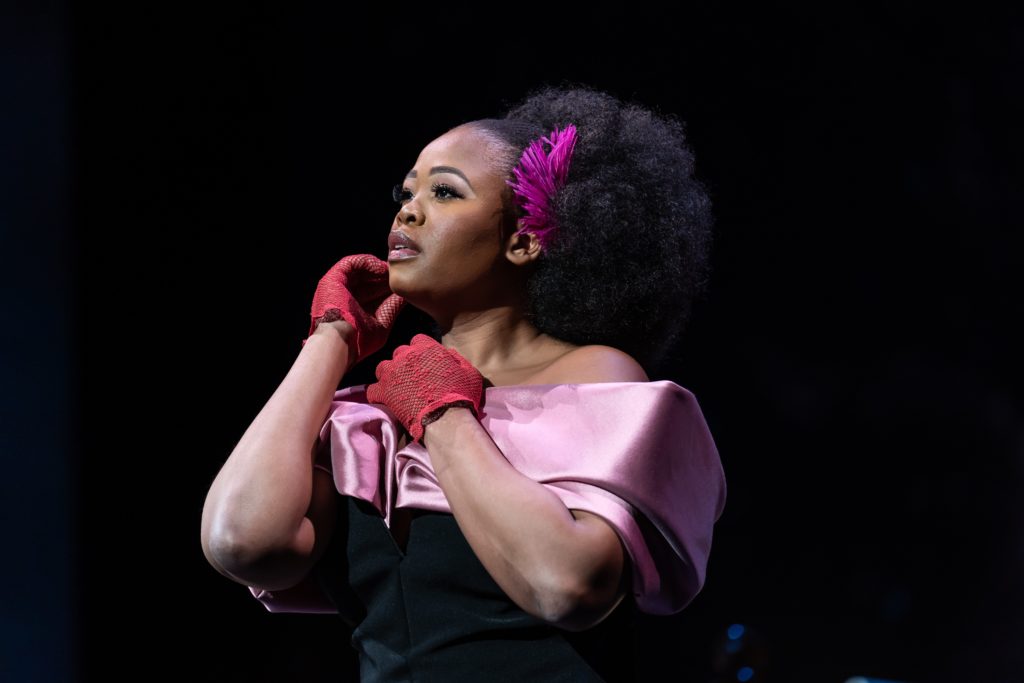
Credit: Scott Suchman
Justice
The second half kicked off with a searing orchestral interlude to Beethoven’s “Fidelio” that Rogister shaped with delicacy and moodiness. That led into ʺGott! Welch Dunkel hier!…In des lebensʺ which Philip opened with a pianissimo on “Gott” that he slowly crescendoed into a fortissimo. He would return to the subtle tone throughout the first recitative bringing out the pain of his character. As he climbed into the higher tessitura, the voice rang with power and desperation. The aria portion was splendidly shaped with long legato lines that resembled those of Bel Canto operas and that displayed the gentle tones of Philip’s virile instrument. The final allegro portion displayed Philip’s outstanding breath control as he delivered the syncopated rhythms with an ardent tone and a powerful ringing high tessitura.
Perhaps the weakest part of the evening was the quartet ʺMir ist so wunderbarʺ from “Fidelio” performed by Alexandria Shiner, Suzannah Waddington, Duke Kim, and Christian Simmons. Unfortunately, the four voices never quite meshed and it seemed like Waddington was the only one that had complete control of the ensemble and her part.
After the two sections from “Fidelio,” General Director Tim O’Leary and Lawrence Brownlee came out to pay tribute to the late Justice Ruth Bader Ginsburg. The two spoke of the Judge’s love for opera and the memories of having her in the opera house often. That was followed by a moving video tribute that included footage of Ginsburg performing “La Fille du Regiment” at the WNO. Brownlee then took the stage to perform ʺAh! mes amis, quel jour de fête!…Pour mon âme.ʺ Brownlee has probably performed this aria more times than any other, and on this evening he expertly dispatched the nine high Cs that Donizetti wrote with a jubilant tone and with a smile on his face. It was a showstopper.
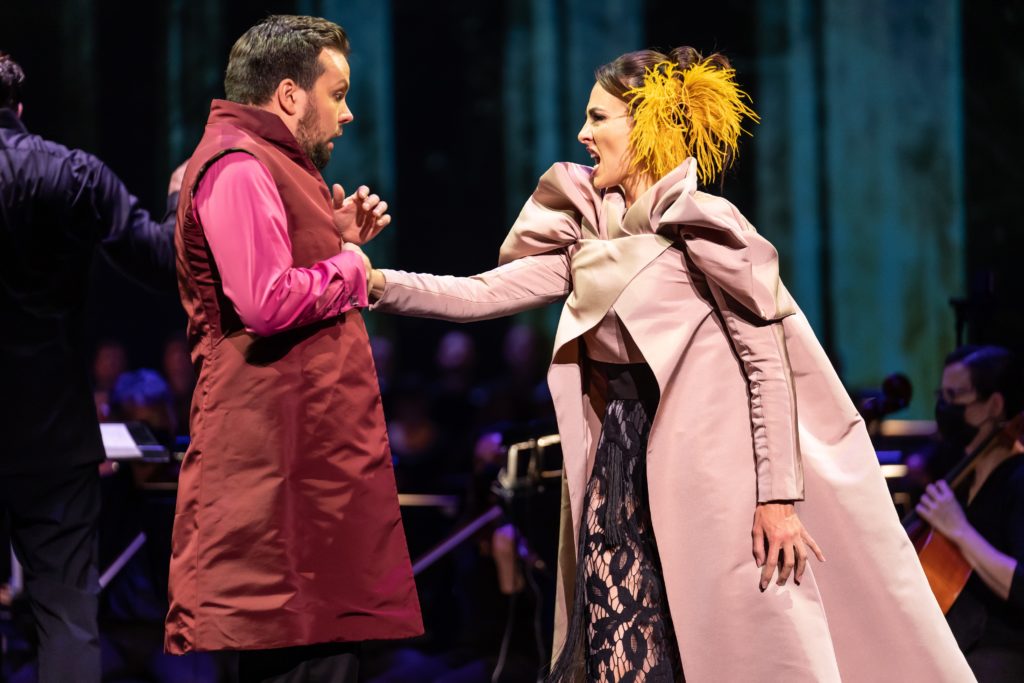
Credit: Scott Suchman
Liberty
The opening of the portion began with Yende performing the final scene from the first act of “La Traviata.” Yende began with a gorgeously phrased ʺÈ strano!…Ah, fors’è lui” that she shaped with crescendoes and decrescendos and which once again showcased her fuller middle voice. During the lines “Misterioso, altero,” she sang with a piano sound that rang purely into the hall and then suddenly passionately crescendoed on the line “Croce e delizia al cor!” Her subsequent “Sempre liberaʺ was admirable if imperfect. Yende sings the cabaletta with such an imposing character that all the flaws are forgotten as she delivers the devilish coloratura lines accurately and precisely and seems to be enjoying every moment of it. But there were moments where her tone went from beautiful to grainy and pushed, particularly as she opened up into her higher tessitura on the phrase “ritrovi.” Additionally, her final E Flat did not ring purely. Duke Kim accompanied her during the cabaletta with a smooth legato tone.
Van Horn followed Yende with ʺCome dal cielʺ from “Macbeth” with a robust sound that displayed a mix of strength and agony. Like his previous solo pieces, the bass once again showcased what an emotional performer he can be and how he can flexibly sing the long and demanding Verdi lines with a consistent and effective tone.
The final duet ʺC’est toi? C’est moi!ʺ from “Carmen,” performed by Leonard and Philip, was the most dramatic selection of the evening. The performance was filled with tension as Philip gave it his all throughout, running toward Leonard’s Carmen and even kneeling down pleading for her love. Here he released all the power of his voice, displaying ardent high notes, especially his B Flat on the lines “Pour la dernière fois, démon,” and expressive phrasing that only left me wanting to see him in the entire opera. Juxtaposing Philip’s desperation was Leonard who showcased an icy quality to her Carmen that was commanding and magnetic. Her voice possessed a strong and resonating sound especially in the higher tessitura and in her more declamatory lines “Ou laisse-moi passer” and “Tu me l’avais donnée, tiens.” With both singers committed and acting their characters, Leonard and Philip created one of the highlights of the evenings.
The penultimate piece of the evening was ʺAsile héréditaire…Amis, amis, secondez ma vengeanceʺ from “Guillame Tell.” Here Brownlee showed two contrasting parts of his voice. In the aria “ʺAsile héréditaire,ʺ Brownlee caressed the Rossini line with warm and fluid phrasing that displayed a gorgeous and flexible instrument that moved between the middle range and higher tones with ease. There was always a sense of control but at the same time, one could sense that yearning in Brownlee’s delicacy. Then in the cavatina, “Amis, amis, secondez ma vengeance,” Brownlee moved into powerful and virtuosic singing that displayed a ringing top that gained power and vibrancy as he moved into the second repeat. Accompanied by the chorus in the coda, Brownlee’s voice rang with heroic strength and ended with a climactic high C. One issue with the performance came from Rogister’s conducting as he had a tendency of emphasizing the brass section and making them all too present, taking away from the preciseness of Rossini’s orchestral writing and ultimately making it a bit too bombastic.
The program concluded with the Finale to “Guillaume Tell,” which is a climatic cry of liberty between soloists and chorus. It is one of the most gorgeous endings in opera and it was the perfect way to cap the evening. The soloists performed with everything they had left and were accompanied beautifully by the chorus. Unfortunately, the orchestral reading was bogged down by harsh phrasings and a triangle that rang awkwardly into the theater; it was impossible to overlook. Yet as the soloists’ power grew toward the climactic final “Liberté,” the ensemble’s voices rang gloriously into the hall.
Ultimately, this was a triumphant and emotional evening for the Washington National Opera as it returned to live performances after almost two years closed due to the pandemic. There are three performances left of this show and it is an evening that will definitely leave opera lovers in tears.
